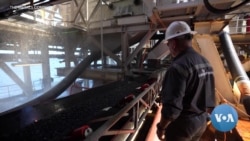Mining for renewable energy metals deep in the Pacific Ocean raises concerns.
Welcome to VOA Asia Weekly. I'm Chris Casquejo in Washington. That story is coming up, but first, making headlines:
The first group of injured evacuees from Gaza crossed into Egypt on Wednesday, as some foreigners and critically wounded individuals were allowed to leave Gaza. This evacuation was mediated through a Qatari-brokered deal among Israel, Hamas, and Egypt. The evacuation followed the first Israeli airstrike at Gaza’s largest refugee camp on Tuesday, as Palestinian health officials reported at least 50 Palestinians died and 150 wounded.
South Korea’s top spy agency believes that North Korea has sent more than a million artillery shells to Russia since August. A lawmaker who attended a closed-door briefing on Wednesday with intelligence officials said this action was intended to support Russian President Vladimir Putin’s war on Ukraine.
Japanese police ended an eight-hour hostage standoff Tuesday at a post office north of Tokyo by arresting the 86-year-old armed suspect. The two hostages were freed, and authorities said this event could be related to an earlier shooting at a hospital, where two people were wounded in a nearby city.
The trial of a New Zealand tourism company that was accused of a safety breach after 22 people died in a 2019 volcanic eruption ended on Tuesday. After finding the company guilty, the judge said the company should have sought expert advice and either stopped the tours entirely or put controls in place.
The United States military started bulk-buying Japanese seafood to counter China’s ban on it after Tokyo released treated wastewater from the Fukushima nuclear plant into the sea. On Tuesday, the supermarket at the U.S. military’s Yokota Air Base in Tokyo started stocking Japanese scallops.
Deep beneath the Pacific Ocean, vast metal deposits crucial for renewable energy are waiting to be harvested by mining companies. However, the potential ecological impact of mining in this massive area, roughly half the size of the continental United States, remains uncertain. VOA’s Steve Baragona reports.
These black rocks are loaded with some of the most important minerals in the world today, including cobalt, manganese and nickel.
Canada-based The Metals Company gathered them off the deep seabed some five thousand meters down.
The company has access to about 1.6 billion tons of them, according to CEO Gerard Barron.
"That's enough to be able to build 280 million mid-sized electric vehicle batteries. So, enough to electrify the entire U.S. passenger fleet."
As the world transitions away from fossil fuels, the demand for metals is increasing. Meeting global climate goals will require roughly 20 times more nickel and cobalt by 2040 than are used now.
"The focus has to be on where can we get a supply of these metals that is secure, but also with the lightest planetary and human impact."
Estimates say there's more of these metals on the seabed than in all the reserves on land.
And Barron says they come without the human exploitation that plagues cobalt mining in the top producer, the Democratic Republic of Congo; or the rainforest razing seen in the leading nickel supplier, Indonesia.
But there will be environmental consequences. The deep seafloor is one of the world's most extreme environments, but it's not lifeless.
"You land on the seabed and, to be brutally honest, there doesn't look like there's much life there. You see the nodules. You see mud. It's only when you sieve those muds on a fine sieve and pick the nodules up and look at them down a microscope at the surface, you discover there's quite a lot of biodiversity in it."
Glover's team recently identified more than 5,000 never-before-seen species. How they all fit into the ocean ecosystem is a big unknown.
Also unknown is how the noise, light and plumes of mud from mining operations would affect ocean life.
The International Seabed Authority is working on regulations for this new industry. Glover and others are advising it, including on where to put refuges.
But The Metals Company says it plans to submit a mining application late next year, bringing the controversy over deep-sea mining back to the surface.
Steve Baragona, VOA News.
Visit voanews.com for the most up-to-date stories.
I’m Chris Casquejo.
And now, we take you to Taiwan’s annual Pride parade.
Crowds gathered in Taipei for East Asia’s largest Pride march as Taiwan’s Vice President Lai Ching-Te joined the parade.
Thanks for watching VOA Asia Weekly.











